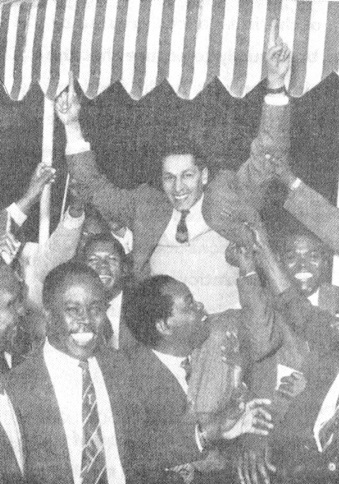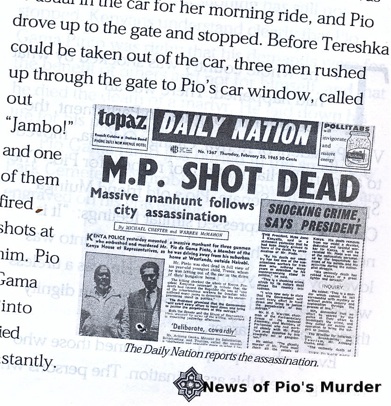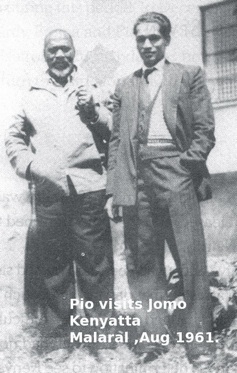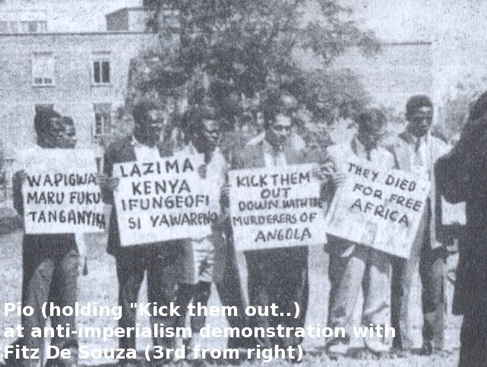From Wikipedia:
Pio Gama Pinto
Pio Gama Pinto (March 31, 1927 – February 25, 1965) was a Kenyan journalist and politician.
Early years
At age eight, he was sent to India for his education and spent the next nine years there. He studied the arts for two years before joining the Indian Air Force in 1944 for a short time. When seventeen, he started agitating against the system which kept so many people of Goa in poverty.
Political career
In 1949 he returned to Kenya and, after a succession of clerical jobs, became involved in the local politics aimed at overthrowing colonialism. Kenya at that time was still under British rule. He turned to journalism and worked with the Colonial Times and theDaily Chronicle. In 1954, five months after his marriage, he was rounded up in the notorious Operation Anvil and spent the next four years in detention on Manda Island. He was kept in restriction from early 1958 until October 1959 at the remote Kabarnet.
In 1960 he founded the Kenya African National Union (KANU) newspaper Sauti Ya KANU, and later, Pan African Press, of which he subsequently became Director and Secretary. He was actively involved in the1961 Elections to make KANU victorious and, in 1963, was elected a Member of the Central Legislative Assembly. In July 1964, he was appointed a Specially Elected Member of the House of Representatives. Also in 1964, he worked late hours to establish the Lumumba Institute, which was principally used to train Party Officials. He was a member of the Board of Governors and took keen interest in its functions.
Assassination
In Nairobi, on February 25, 1965, Pinto was shot down at very close range on the driveway while waiting for the gate to open. He was with his daughter in his car at the time of his killing. Kisilu Mutua was arrested for the killing. Kenyans widely believe that he was killed by Kiambu mafia.[1] At the time of his assassination, Pinto left his wife, Emma; his eldest daughter, Linda, age six; the second, Malusha, age four and a half; and the youngest, Tereshka, one and a half years old.

Pio Elected to parliament July 1964
from http://kenya2012.blogspot.com
Courtesy to the poster “siRKen”
Cabral Pinto: Life and times of Pio Gama Pinto
From 2pm to 5pm on Saturday (21st Feb 2009), at Nairobi’s Professional Centre, a poet and former detainee, Mr Abdilatif Abdalla, will be a special guest at a function to mark what the organisers call Kimathi-Pinto Day 2009. The Mau Mau Research Centre is organising the event in collaboration with several other pro-democracy groups.
It is important for Kenyans to start remembering their patriots for change since the state does not do so. Would it not have been a great gesture on the part of the state if prisoners serving short sentences were released on February 18 in remembrance of the hanging of Kimathi by the British?
Mr Pheroze Nowrojee, a prominent lawyer, poet and political worker has written a great book on Antonio Rudolfo Jose Pio Gama Pinto. He calls Pinto a patriot for social change and shows this in his usual simple, clear language.
Pinto’s political mentors were the architects and patriots of Indian independence, prominently Mahatma Gandhi and Jawharlal Nehru.
Like them Pinto spent the rest of his life fighting for Kenya’s freedom. Pinto was a journalist whose activism and struggle were reflected in not only liberation journalism, but also in trade unionism and organising political parties such as the Kenya Indian Congress, the Kenya African Union and, later, the Kenya African National Union (Kanu).
Pinto was also a member of the Mau Mau central committee, the first vanguard of the group’s war of independence. He helped freedom fighters in the forests of Mount Kenya and the Aberdares by providing arms and supplies. He also looked after the families of the freedom fighters, including those who had been killed.
All these were activities that carried the death penalty during the British-imposed state of emergency. Like all patriots for change, Pinto was courageous and constantly outwitted the enemy. He was also a great pan-Africanist.
The British government detained him, but a revolutionary does not give up the struggle for change in the enemy’s prisons and detention camps, where he exposed colonial segregation. He also organised football matches in prison.
Pinto himself was a great sprinter and was chosen by the colonial government to represent colonial Kenya in the 400m and 800m races at the Commonwealth Games in Vancouver
in 1952. But declined to take part, saying that his work for the country could not allow him several months to train and compete.
Pinto was in detention and restriction for five and a half years, and upon his release, he was involved in the campaign for the release of Jomo Kenyatta and all other detainees and prisoners.
He continued his liberation journalism work, raised funds for the detainees and those who were released. Like all revolutionaries, he was selfless and generous and loved all Kenyans.
As Che Guevara has written, “the true revolutionary is guided by great feelings of love.”
Pinto was no different. It was this love for Kenya and Kenyans that made him stand up against the Kenyatta regime which he saw as a reincarnation of the colonial administration.
William Attwood, the first US ambassador to Kenya and author of the still banned book, The Reds and the Blacks: A Personal Adventure, was a Cold War warrior with a clear mandate to keep Kenya in the Western bloc.
The opposition to the Kenyatta regime, spearheaded by Jaramogi Oginga Odinga, fought for Kenya’s independence, although in the eyes of Attwood, it wanted to place Kenya in Eastern bloc.
Attwood describes Pinto as a “brilliant tactician,” whose “priority objectives were to whittle down British influence, especially in the army and police, broaden his political base to other tribes and
become the champion of landless peasants and the urban unemployed.” He also describes Pinto as Odinga’s “chief political adviser.”
It was for his struggle for true independence and for social justice for the poor, vulnerable and marginalised Kenyans that Pinto made powerful enemies from within and outside Kenya.
On the morning of February 24, 1965, three men rushed up through his home gate (Pinto’s home was where Sarit Centre is now) and to his car window, called out: “Jambo!” and one of them fired at him, killing him instantly.
On Saturday, as Kimathi-Pinto Day is celebrated, we have mentors and models for patriotic change. True reformers cannot any more claim they do not have political role models to help them fundamentally change this country.
We should live to the words and the spirit engraved in Pinto’s gravestone at Nairobi’s City Park cemetery: “A light has been extinguished. Yet there arise a thousand beacons from the spark he bore.”
Kenyan reformers should be part of the thousand beacons from Pinto’s spark.



